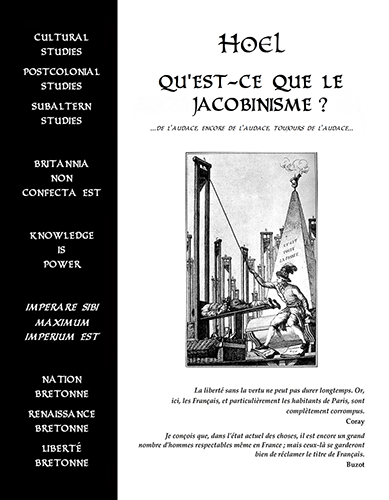The French revolutionaries maintained slavery in the colonies as late as the 4 February 1794 (16 pluviôse an II). In Saint-Domingue, the slavery was already officially abolished by Sonthonax in the north province, the 29 August 1793, and by Polverel in the west and south provinces, the 31 October 1793. But the black slaves had largely freed themselves before. The slaves began their revolt in August 1791. Their greater leaders made alliance with the Spanish of Santo-Domingo.
Sonthonax and Polverel called themselves “jacobins of 92” and think of themselves as “the real patriots” (les véritables patriotes), by opposition with the “jacobins of the 9 thermidor” (jacobins du 9 thermidor). They were friends of Brissot, who sent them to Saint-Domingue.
The abolition of slavery in the French colonies on the 4 February 1794 was made after a long speech by Dufay, a white man, one of the three deputies (a white, a man of colour and a black) sent by Sonthonax. That day, Danton said: “Representatives of the French people, so far we have decreed freedom only as egoists and for ourselves alone.” (Représentants du peuple français, jusqu’ici nous n’avons décrété la liberté qu’en égoïstes et pour nous seuls.)
For Saint-Domingue, the choice of the deputies was not between to abolish or not the slavery (it was already abolished in the reality, there were no more slaves in Saint-Domingue), but between to confirm its abolition or to risk completely losing the colony to the blacks, who were then the real masters of the colony, or to the Spanish, or to the English.
The abolition of slavery by the convention was then not the application of a “principle”, but an act of interest, the way to try to maintain French domination on Saint-Domingue, largely the most important colony of France at the time, with around 500.000 black people.
Postcolonial Brittany: Literature Between Languages
« This book investigates the space between the two languages of modern-day Brittany through a series of close readings of literary texts that represent Brittany or Bretonness in the French language. This is the space that is negotiated by translation, be it a smooth translation of Breton scenes and themes into a French fit for the salons of the capital, or a foreignizing translation of Breton motifs into a French that writhes and struggles to accommodate them. It is also the space negotiated by the bilingual author who writes in the shadow of the other language: the literary conventions of one may litter his work in the other, or the idioms and syntax of one may make their ghostly presence felt in the other. But it can equally be a space of violence as in the case of the writer whose whole community has lost its mother tongue, and writes under protest in the language of the cultural oppressor or colonizer. As the first sustained analysis of the literature produced between French and Breton, this book shows us how literary language is affected by such inter-cultural tensions, and also what it can mean to be caught between cultures. »



